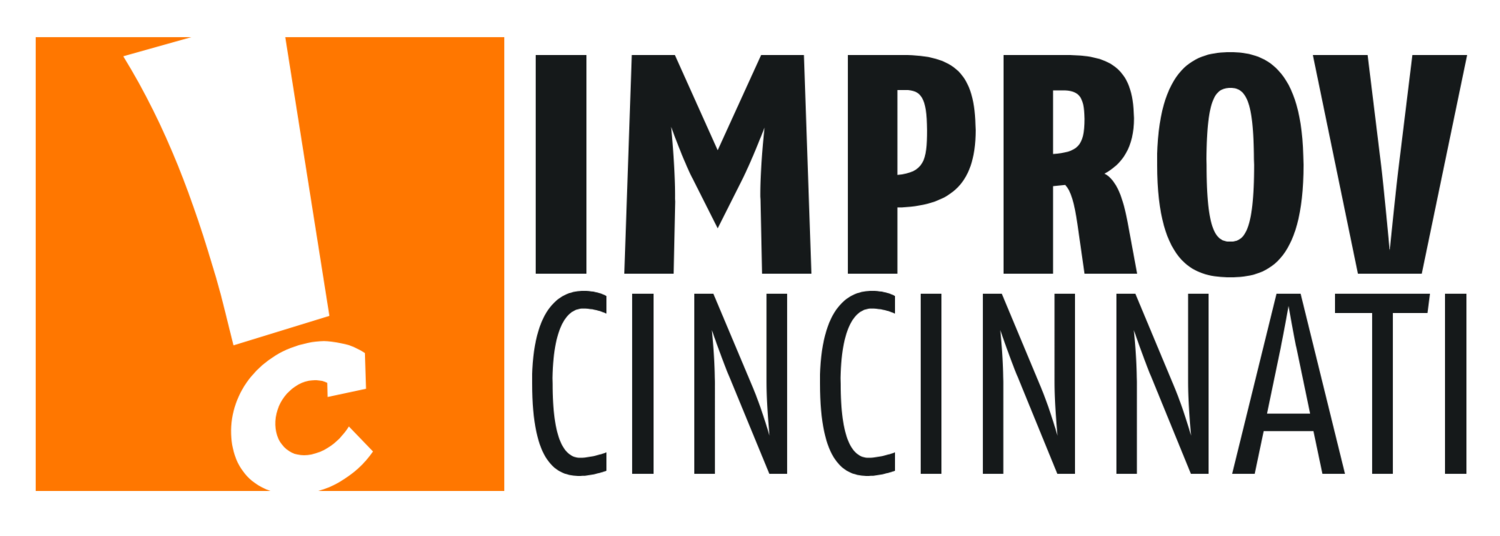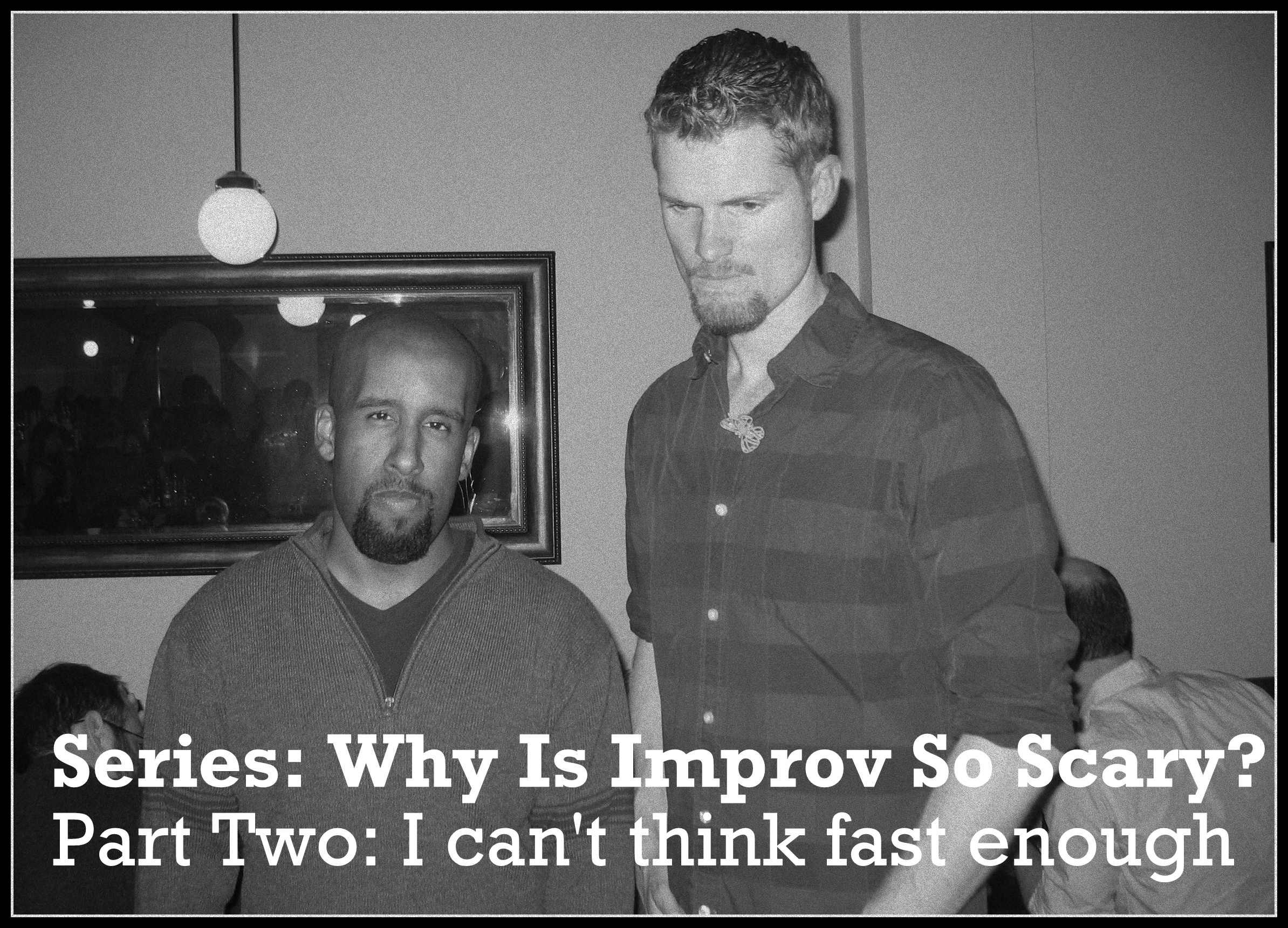Why Is Improv So Scary? Part Two: "I can't think fast enough"
/Click here to read the Introduction and Part One.
Don’t think about your grandpa in the bathtub.
You thought about it, right?
Our powers of association are so strong that once we trip that wire, there’s no going back. (And sorry about your wrinkly, wet, naked grandpa. We can stop thinking about it now.)
Now name me five fake islands in the Pacific Ocean. Right now. Say them out loud.
Okay, why was that one so hard? It was essentially the same exercise as the one about your pruny, sudsy, bare-skinned grandpa. I even said the islands should be fake. You could have said literally anything.
I’ll give you my hypothesis: It’s not because your brain doesn’t work fast enough. It’s because you wanted to say things that sound like they could be island names.
This week, we’re talking about the second most common fear we heard when we asked people why improv is so scary: “I can’t think fast enough.” However, as we’re already starting to see, our fear of being slow might be masking our fear of being wrong. (Kind of like that fear of feeling unfunny could be better described as a fear of feeling shut off or disconnected. A PATTERN EMERGES.)
From the first day we march into kindergarten with our stupid bangs and our brand new red Tommy Hilfiger dress, we learn that there are right answers and wrong answers. We spend about 12 to 16 years of our lives thinking about whether our answers are right or wrong. Which makes sense. Because I don’t want my doctor or my mechanic or my lawyer or my accountant just doing “what feels right.”
But then we can’t turn it off. We’re trapped in a brain that obsessively sorts things into right and wrong.
This concern about wrongness isn’t limited to school, either. When we embarrass ourselves in a social situation, we say that we “said the wrong thing.” When we turn off our right-and-wrong filter and speak off the cuff, we are penalized with raised eyebrows or uncomfortable silences.
I called my friend Emily Riggin from the small town in Ohio where I grew up to talk about “quick thinking” and why it dissuades people from trying improv. Emily is a professional performer living in Los Angeles. She’s never done improv, but she likes watching it. Here’s a snippet of our conversation:
TH: Describe what is going through your head when you’re struggling to think quickly
ER: It’s trying to figure out what sounds best in a really small amount of time. Does that sound good? Is that going to make sense? Instead of just saying the first thing that comes. I think the control freak in me is trying to make sure everything is concise and works in all situations.
TH: What is the difference between quick thinkers and slow thinkers?
ER: It’s weighing every possible option. For some people, that can be done really quickly. I’m doing that as I talk to you, actually.
TH: Do you notice yourself “thinking slowly” in scenarios other than improv?
ER: If I’m having a serious conversation, I feel like my words aren’t conveying what I want to say. I’m not an in-the-moment type of person. It’s odd. It’s something I’ve noticed these past few years, growing up and being an adult. You have to have serious conversations, and conversations in a professional environment. I have all these good thoughts in my head about what I want to say to someone, and then when they’re in front of me it’s hard to be concise and to repeat those things I was thinking.
TH: Why is it important to be a quick thinker in improv?
ER: It’s supposed to be kind of like a real-life situation. You don’t have time to stop and think about, “What am I going to do next?” And then, on top of that, you have to be funny. If somebody pulls a fast one on you and changes the way your mind thought the situation was going, you have to stop and completely change your thinking. You have to be aware of everything’s that’s going on, and then also put funny stuff on top of it.
TH: What are you usually trying to think of when you catch yourself feeling slow?
ER: That happens if I'm in front of people. But to bring it back to improv, if I had to go onstage with a scenario that got thrown at me three minutes before I went onstage, I would be thinking so hard, I wouldn’t be able to pay attention to the person onstage with me. I’d say something really dumb. That’s what scares me the most about trying improv. You’re just a blank slate.
Emily nailed it when she described improv as a “blank slate.” It’s scary when your ability to pre-plan conversations and scenarios is pulled out from under you.
I also liked how Emily, very honestly, expressed her concern about “what sounds best” and “does that sound good.” It illustrates our awareness that other people are listening, and we don’t want to say the wrong thing.
There’s no easy fix for the fear of saying the wrong thing because it’s part of who we are. It keeps us comfortable and safe in many situations, and it holds us back in many others. Improv serves the very specific function of giving us a space where we can turn off our editors without fear of blank stares or shifting feet. We don’t become more right. But the stakes of being wrong go down. Over time, in that space, with those people, we can start to just say stuff. Our brains have changed. Not to become faster, but to become more confident, more trusting – of ourselves and of others. And eventually, that ability seeps into other areas of our lives.
One of my coworkers uses a saying I love: “There’s no right and wrong in theater. Only boring and interesting.” I think the same goes for improv. It is fun and freeing to think about what interests us, instead of what sounds right to others.
Join us next week to look at another fear, “I’ll look ridiculous,” and to see if Tatum has gotten any better at smiling since her first day of kindergarten.



